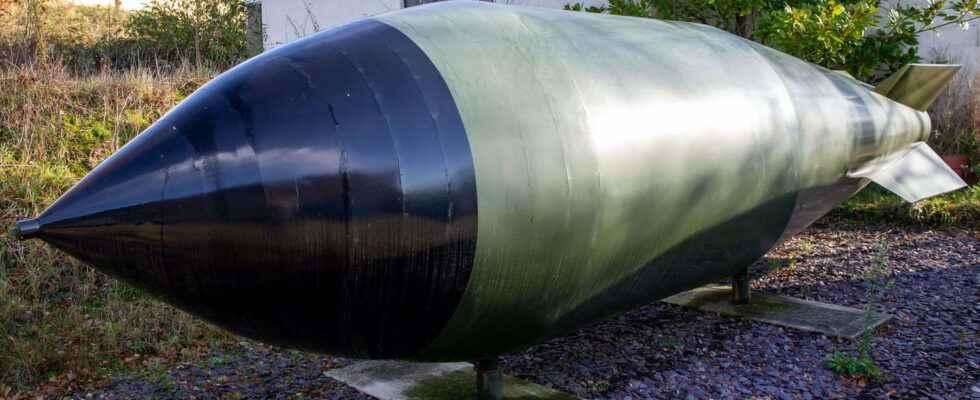ATOMIC BOMB. Russia raised the threat of nuclear weapons during the announcement of the massive military operation in Ukraine, Thursday, February 24, 2022. Who are the powers with atomic bombs and who has the largest arsenal?
Just before starting a war in Ukraine, Thursday, February 24, 2022, Vladimir Putin reminded the powers tempted to intervene in the conflict that Russia is one of the “greatest nuclear powers in the world”. Moscow is trying to create a climate of fear to dissuade Western nations from taking part in the war between it and Ukraine, but nuclear weapons are not the preserve of the Kremlin. The United States, the only country to have used the atomic bomb twice during the Second World War, but also Europe, among others, can also raise the threat of a nuclear attack. Jean-Yves Le Drian, Minister of Foreign Affairs has also responded to the provocation of the President of the Russian Federation: “Vladimir Putin must also understand that the Atlantic Alliance is a nuclear alliance”.
Few powers can boast of possessing nuclear weapons and among the rare nations to have one or more bombs, some would very quickly be in a weak position if a nuclear war were to break out. Which are the best and most equipped countries? Who has the biggest strike force? And are some nations seeking to join the very restricted club of nuclear powers? Linternaute.com answers all your questions.
Which countries have nuclear weapons?
Only nine countries in the world are equipped with nuclear weapons, the ultimate offensive technology. The United States was the first to acquire the atomic bomb in 1940 during the Manhattan Project. Within twenty years, they were joined by the Soviet Union (1949), the United Kingdom (1952), France (1960) and China (1964). These five nations are the only ones known to have official nuclear weapons, the other four nuclear powers – India, Pakistan, Israel and North Korea – having seized the nuclear bomb in the greatest secrecy. . India, Pakistan and Israel are at the same time the only countries, with South Sudan, not to have signed the Nuclear Non-Proliferation Treaty (NPT) in 1968, North Korea withdrew from the treaty in 2003. The International Treaty is the guarantee that other nuclear powers will not appear.
Who has the most atomic bombs?
While nine countries have nuclear weapons, 90% of the world’s arsenal is held by Russia and the United States. Moscow is also slightly more equipped than the Americans with 6225 warheads against 5550 according to data from the Stockholm International Peace Research Institute. Then come China and its 350 warheads, France (290) and the United Kingdom (225). For the countries possessing the nuclear bomb by illegal means, Pakistan is the best equipped (165) followed by India (156), Israel (90) and North Korea (45).
Where are the atomic bombs stored?
The 13,000 nuclear bombs would be spread across fourteen countries. While all holders of nuclear weapons store their arsenal on their national territory, the United States has certain weapons in Germany, Belgium, Italy, the Netherlands and Turkey. This storage in “friendly” countries is permitted by a NATO agreement on nuclear sharing.
Can other countries get nuclear weapons?
The Treaty on the Non-Proliferation of Nuclear Weapons prevents signatory non-nuclearized countries from acquiring atomic weapons. Concluded in 1968 for entry into force in 1970, the objective of the document initiated by the United Nations is to prohibit States that do not possess nuclear weapons from obtaining them and nuclearized countries from helping other nations. to arm themselves with military technology. In theory, a signatory country that wishes to acquire nuclear power must withdraw from the International Treaty, which would have the effect of arousing the suspicions and distrust of other world powers. In practice, North Korea succeeded in obtaining the atomic weapon thanks to clandestine research started in 1989 and left the device only in 2003 when the Korean nuclear program was made public.
Is the use of the atomic bomb regulated?
The United Nations has been working since its creation to guarantee the use of nuclear weapons only for peaceful purposes thanks to a dedicated commission. It is assisted by the International Atomic Energy Agency, which ensures compliance by all signatory countries with the Treaty on the Non-Proliferation of Nuclear Weapons. The NPT has no power to limit the use of the nuclear bomb for countries equipped with the technology.
In 2021, a step forward was taken towards banning the nuclear bomb with the entry into force of the Treaty on the Prohibition of Nuclear Weapons (TIAN) supported by the International Campaign to Abolish Nuclear Weapons (ICAN) and ratified by fifty States at the United Nations Assembly. The TIAN prohibits signatory countries “from using, threatening to use, developing, testing, producing, manufacturing, acquiring, possessing or stockpiling nuclear weapons”. Of the fifty States party to the Treaty, none has the nuclear bomb but in the event that a nuclear country signs the TIAN, it must either have destroyed its arsenal before becoming a party to the Treaty, or undertake to destroy it according to a “a legally binding and time-bound plan for the verified and irreversible abandonment of [leur] nuclear weapons program.
